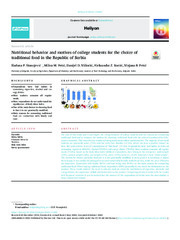Приказ основних података о документу
Nutritional behavior and motives of college students for the choice of traditional food in the Republic of Serbia
| dc.creator | Stanojević, Slađana P. | |
| dc.creator | Pešić, Milica M. | |
| dc.creator | Milinčić, Danijel D. | |
| dc.creator | Kostić, Aleksandar Ž | |
| dc.creator | Pešić, Mirjana B. | |
| dc.date.accessioned | 2022-10-27T12:14:32Z | |
| dc.date.available | 2022-10-27T12:14:32Z | |
| dc.date.issued | 2022 | |
| dc.identifier.issn | 2405-8440 | |
| dc.identifier.uri | http://www.ncbi.nlm.nih.gov/pubmed/36267383 | |
| dc.identifier.uri | http://aspace.agrif.bg.ac.rs/handle/123456789/6202 | |
| dc.description.abstract | The aim of this study was to investigate the eating behavior of college students and the reasons for consuming traditional food and to compare the motives for choosing traditional food with the research conducted in 6 European countries. This research was conducted using anonymous online questionnaires. The majority of surveyed students are physically active (75%) and live with their families (57.0%), which can have a positive impact on their diet and a lower level of consumption of "fast-food" (17.5%). Respondents have bad habits in terms of consuming cigarettes (65.0%), alcohol (73.0%) and energy drinks (75.0%). Most students consume all regular meals (73.0%). Based on the Body Mass Index (BMI) of respondents, they belong to the categories: underweight (12%), normal weight (34%), pre-weight (17%), obese (37%); however, 55.0% believed to have "ideal weight". The reasons for choose particular food are: it is not genetically modified, it tastes good, it is nutritious, it makes them happy, it was produced/packaged in an environmentally friendly and ethical way, while the price of food is not important. Connection with family (81%) and food being tasty (54%) are the main reasons for consuming traditional food. When buying traditional food, respondents (59%) generally do not check the declaration on the product. These results indicate the need to educate students about the harmfulness of cigarettes, alcoholic and energy drinks, the importance of BMI and declaration on the product. Comparing obtained results with the results in 6 European countries it can be noticed that the answers of the respondents in Serbia were the most similar to those obtained in Poland. | |
| dc.language | eng | |
| dc.relation | info:eu-repo/grantAgreement/MESTD/inst-2020/200116/RS// | |
| dc.rights | openAccess | |
| dc.rights.uri | https://creativecommons.org/licenses/by/4.0/ | |
| dc.source | Heliyon | |
| dc.source | HeliyonHeliyon | |
| dc.subject | Body mass index | |
| dc.subject | Consumer behavior | |
| dc.subject | Eating habits | |
| dc.subject | Nutrition | |
| dc.subject | Survey questionnaire | |
| dc.title | Nutritional behavior and motives of college students for the choice of traditional food in the Republic of Serbia | |
| dc.type | article | en |
| dc.rights.license | BY | |
| dc.citation.issue | 10 | |
| dc.citation.rank | M22 | |
| dc.citation.spage | e11002 | |
| dc.citation.volume | 8 | |
| dc.identifier.doi | 10.1016/j.heliyon.2022.e11002 | |
| dc.identifier.fulltext | http://aspace.agrif.bg.ac.rs/bitstream/id/24115/Nutritional_behavior_and_pub_2022.pdf | |
| dc.type.version | publishedVersion |


